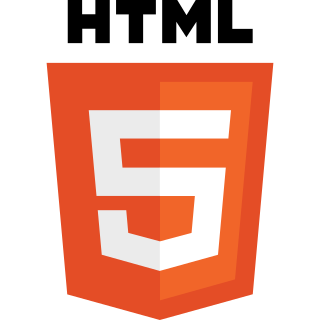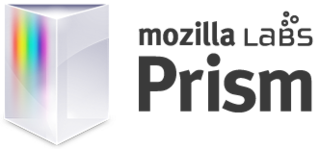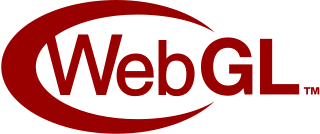
The Document Object Model (DOM) is a cross-platform and language-independent application programming interface that treats an HTML, XHTML, or XML document as a tree structure wherein each node is an object representing a part of the document. The DOM represents a document with a logical tree. Each branch of the tree ends in a node, and each node contains objects. DOM methods allow programmatic access to the tree; with them one can change the structure, style or content of a document. Nodes can have event handlers attached to them. Once an event is triggered, the event handlers get executed.

Gecko is a browser engine developed by Mozilla. It is used in the Firefox browser, the Thunderbird email client, and many other projects.
Netscape Plugin Application Programming Interface (NPAPI) is a deprecated application programming interface (API) that allows browser extensions to be developed. It was first developed for Netscape browsers, starting in 1995 with Netscape Navigator 2.0, but was subsequently adopted by other browsers. With the advent of HTML5 many software vendors have removed support for this API for security reasons.

TiddlyWiki is a personal wiki and a non-linear notebook for organising and sharing complex information. It is an open-source single page application wiki in the form of a single HTML file that includes CSS, JavaScript, and the content. It is designed to be easy to customize and re-shape depending on application. It facilitates re-use of content by dividing it into small pieces called Tiddlers.
A Web API is an application programming interface for either a web server or a web browser. It is a web development concept, usually limited to a web application's client-side, and thus usually does not include web server or browser implementation details such as SAPIs or APIs unless publicly accessible by a remote web application.
A browser extension is a small software module for customizing a web browser. Browsers typically allow a variety of extensions, including user interface modifications, ad blocking, and cookie management.
MDN Web Docs, previously Mozilla Developer Network and formerly Mozilla Developer Center, is the official Mozilla website for development documentation of web standards and Mozilla projects.

HTML 5 is a software solution stack that defines the properties and behaviors of web page content by implementing a markup based pattern to it.

Mozilla Prism is a discontinued project which integrated web applications with the desktop, allowing web applications to be launched from the desktop and configured independently of the default web browser. As of November 2010, Prism is listed as an inactive project at the Mozilla labs website.
Web storage, sometimes known as DOM storage, provides web application software methods and protocols used for storing data in a web browser. Web storage supports persistent data storage, similar to cookies but with a greatly enhanced capacity and no information stored in the HTTP request header. There are two main web storage types: local storage and session storage, behaving similarly to persistent cookies and session cookies respectively.

WebGL is a JavaScript API for rendering interactive 2D and 3D graphics within any compatible web browser without the use of plug-ins. WebGL is fully integrated with other web standards, allowing GPU-accelerated usage of physics and image processing and effects as part of the web page canvas. WebGL elements can be mixed with other HTML elements and composited with other parts of the page or page background. WebGL programs consist of control code written in JavaScript and shader code that is written in OpenGL ES Shading Language, a language similar to C or C++, and is executed on a computer's graphics processing unit (GPU). WebGL is designed and maintained by the non-profit Khronos Group.
The Indexed Database API is a JavaScript application programming interface (API) provided by web browsers for managing a NoSQL database of JSON objects. It is a standard maintained by the World Wide Web Consortium (W3C).

In mobile devices, HTML5 is often used for mobile websites and mobile applications on mobile operating systems such as Firefox OS, Sailfish OS, Tizen and Ubuntu Touch.

Firefox OS is a discontinued open-source operating system – made for smartphones, tablet computers and smart TVs – designed by Mozilla and external contributors. It is based on the rendering engine of the Firefox web browser, Gecko, and on the Linux kernel. It was first commercially released in 2013.
HTML5 Audio is a subject of the HTML5 specification, incorporating audio input, playback, and synthesis, as well as speech to text, in the browser.

Mozilla is a free software community founded in 1998 by members of Netscape. The Mozilla community uses, develops, spreads and supports Mozilla products, thereby promoting exclusively free software and open standards, with only minor exceptions. The community is supported institutionally by the not-for-profit Mozilla Foundation and its tax-paying subsidiary, the Mozilla Corporation.
Web Components are a set of features that provide a standard component model for the Web allowing for encapsulation and interoperability of individual HTML elements.
RESTfulAPIDLs are formal languages designed to provide a structured description of a RESTful web API that is useful both to a human and for automated machine processing. API Description Languages are sometimes called interface description languages (IDLs). The structured description might be used to generate documentation for human programmers; such documentation may be easier to read than free-form documentation, since all documentation generated by the same tool follows the same formatting conventions. Additionally, the description language is usually precise enough to allow automated generation of various software artifacts, like libraries, to access the API from various programming languages, which takes the burden of manually creating them off the programmers.
WebVR is an experimental JavaScript application programming interface (API) that provides support for virtual reality devices, such as the HTC Vive, Oculus Rift, Google Cardboard or OSVR in a web browser.
Progressive web applications (PWAs) are web applications that load like regular web pages or websites but can offer the user functionality such as working offline, push notifications, and device hardware access traditionally available only to native applications. PWAs combine the flexibility of the web with the experience of a native application.










